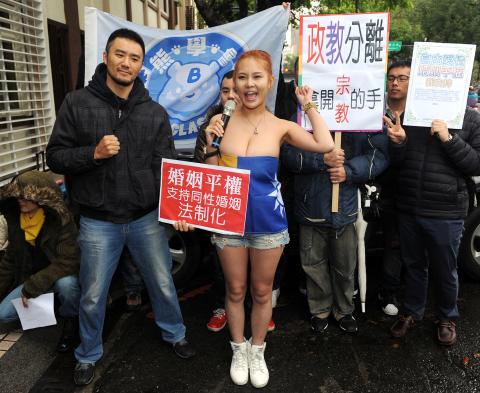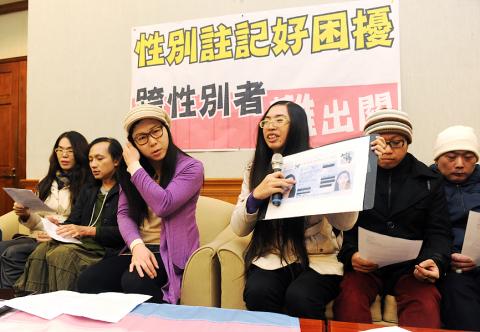Gender rights activist Abbygail Wu (吳伊婷) yesterday accused National Immigration Agency officers of discrimination after she was kept at an immigration counter at Taiwan Taoyuan International Airport for a gender check when she was leaving the country last month.
“My passport states that I am female, and the photograph in it is one that I took a week before I was going to leave, but the immigration officer looked at my passport, and looked at me. He had a confused look on his face for about 10 seconds before he asked whether I was a man or a woman,” Wu told a press conference at the Legislative Yuan in Taipei.
“I knew where he was coming from, so I told him that I have had an official change of gender, and took out other IDs to show him, but he did not seem satisfied with what I said. He called his supervisor over and I was asked to go into an office, where they retrieved a copy of my household registration record and asked many embarrassing questions before letting me go,” she said.

Photo: Lo Pei-der, Taipei Times
Wu said the actions were discriminating, humiliating and disrespectful of a citizen’s privacy.
She compared her experience in Taoyuan with one at San Francisco International Airport when she was heading back to Taiwan.
When a security officer at the San Francisco airport saw a “transgender” sticker on her backpack, “he took the initiative to ask if I would prefer to be searched by a male or female officer when going through the security check,” she said.

Photo: Lo Pei-der, Taipei Times
“Having gone through airport security and immigration checks in Taiwan and the US makes me realize that our immigration officers lack gender awareness,” she said.
Awakening Foundation chairperson Chen Yi-chien (陳宜倩) said what happened to Wu was unacceptable as the government and civic groups have put so much effort into raising gender awareness in recent years.
“We have had the Gender Equality Education Act (性別平等教育法) and gender awareness curriculum at school in place for many, many years. President Ma Ying-jeou (馬英九) had signed the two international human rights covenants, while government policies and legislation are also moving toward promoting gender awareness,” Chen said.
“It is unacceptable that an immigration officer is so lacking in gender awareness — it is not the public’s fault that he cannot update his mindset to 2014, and apparently he is no longer suitable to serve in the position,” she said.
Wu’s case was not an isolated event.
Gender rights activist Yeh Jo-ying (葉若瑛) told the press conference that a voter was asked to go through a gender check before being allowed to vote at a polling station in Greater Taichung, as the voter “looked” female, but her national ID card said she was male.
Jiyi Ng (吳芷儀), president of the Intersex, Transgender and Transsexual People Care Association, said that the gender listing on IDs has been inconvenient for the transgender population, mainly because people have set ideas about what a man or a woman should look like.
“In many countries, for instance Australia, people are now not required to select a gender, people can choose gender ‘X’ besides male or female,” Ng said. “I think this is the direction we should move toward to make it easier for everyone.”

The US government has signed defense cooperation agreements with Japan and the Philippines to boost the deterrence capabilities of countries in the first island chain, a report by the National Security Bureau (NSB) showed. The main countries on the first island chain include the two nations and Taiwan. The bureau is to present the report at a meeting of the legislature’s Foreign Affairs and National Defense Committee tomorrow. The US military has deployed Typhon missile systems to Japan’s Yamaguchi Prefecture and Zambales province in the Philippines during their joint military exercises. It has also installed NMESIS anti-ship systems in Japan’s Okinawa

‘WIN-WIN’: The Philippines, and central and eastern European countries are important potential drone cooperation partners, Minister of Foreign Affairs Lin Chia-lung said Minister of Foreign Affairs Lin Chia-lung (林佳龍) in an interview published yesterday confirmed that there are joint ventures between Taiwan and Poland in the drone industry. Lin made the remark in an exclusive interview with the Chinese-language Liberty Times (the Taipei Times’ sister paper). The government-backed Taiwan Excellence Drone International Business Opportunities Alliance and the Polish Chamber of Unmanned Systems on Wednesday last week signed a memorandum of understanding in Poland to develop a “non-China” supply chain for drones and work together on key technologies. Asked if Taiwan prioritized Poland among central and eastern European countries in drone collaboration, Lin

The Chien Feng IV (勁蜂, Mighty Hornet) loitering munition is on track to enter flight tests next month in connection with potential adoption by Taiwanese and US armed forces, a government source said yesterday. The kamikaze drone, which boasts a range of 1,000km, debuted at the Taipei Aerospace and Defense Technology Exhibition in September, the official said on condition of anonymity. The Chungshan Institute of Science and Technology and US-based Kratos Defense jointly developed the platform by leveraging the engine and airframe of the latter’s MQM-178 Firejet target drone, they said. The uncrewed aerial vehicle is designed to utilize an artificial intelligence computer

Renewed border fighting between Thailand and Cambodia showed no signs of abating yesterday, leaving hundreds of thousands of displaced people in both countries living in strained conditions as more flooded into temporary shelters. Reporters on the Thai side of the border heard sounds of outgoing, indirect fire yesterday. About 400,000 people have been evacuated from affected areas in Thailand and about 700 schools closed while fighting was ongoing in four border provinces, said Thai Rear Admiral Surasant Kongsiri, a spokesman for the military. Cambodia evacuated more than 127,000 villagers and closed hundreds of schools, the Thai Ministry of Defense said. Thailand’s military announced that